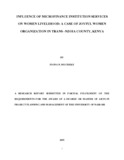| dc.description.abstract | This study investigated the influence of MFIs on women livelihood. A case study of
JOWYO Trans-Nzoia County. Women livelihood is a central to ensure socio-economic
development of any nation. This study was guided by the following objectives;-to establish
whether loans acquisition influences women livelihood, to determine whether training influences
women livelihood, to determine MFI marketing influence on women livelihood, to find out
whether networking influences women livelihood in Trans-Nzoia County, Kenya. A similar
number of research questions facilitated the investigation. The target population was 8,450
women involved in MFIs. A sample of 100 women respondents was used to provide data.
Descriptive survey design was adopted alongside snow ball and convenience sampling to guide
the research process. Questionnaire and interview instruments were used. Questionnaire
reliability was determined through a pilot test re-test technique. Instrument validity was done
though piloting instruments and seeking expert’s interpretation on designing effective
instruments. Data collection was done after obtaining a permit from the National council of
Science and Technology. Data was analyzed using descriptive statistics with the help of
statistical package of social scientists (SPSS) and Microsoft Excel. The finding are presented in
tabulations, frequencies, percentages and means. The key findings for objective one; Loans
acquisition and women livelihood: the study sought to elaborate on the women’s source of
livelihood or income. It was revealed that 50% of women depend on their salary, 29% of women
on farm produce and 21% of women had business as their source of livelihood. Also, on the
reasons for applying for a loan indicated that 33% of the women loan was for the capital of the
business, followed by 32% household needs, 27% was for health related expenses and lastly 8
for the education of the children.. Most important, the study sought to know what the
respondents used as a collateral and the study found out that majority of the respondents 28%
used livestock’s, 25% used title deeds as well as salary, 16% said they used business or shop and
finally used family property at 6%. For the second objective; Training on MFI and women
livelihood: The findings indicated that the types of training JOYWO offered included 32% who
had a training on loan use, 27% had training on savings, 26% had a training on business
management and 15% had a training on financial control. For objective three; Marketing of MFI
and women livelihood. Findings depicted that marketing of JOYWO had benefited the women
since 100% said yes and in view of how marketing had benefited the women, the findings
revealed that 20% had benefited by learning to access credit, 19% had known of its existence and
were able to access it, 17% had improved living status, 15% had become self-reliant women as
well as provided capital for their business and 10% gained good control of finance. For objective
four; Networking of MFI and women livelihood. The study findings on networking included
what networking forms do JOYWO women engage in, 32% of the women said that networking
forms engaged was sensitizing others, 25% said networking was through projects, 24% said table
banking, 10% said by training women in various income generating activities, 5% said through
recruiting other women and 4% networking can be done through formation of self - help groups.
The study concludes that MFI influences women livelihood at a greater extent and should be
advocated at any County to improve the livelihood of women. It further recommends that
loaning should be done more to poor women than those with the salaried to uplift the living
standard of the women. | en_US |

